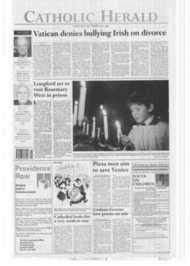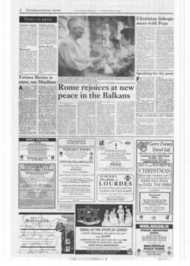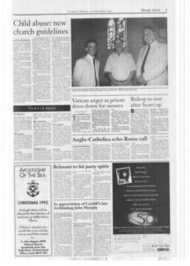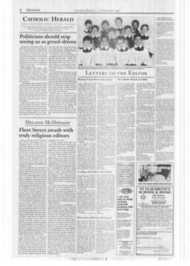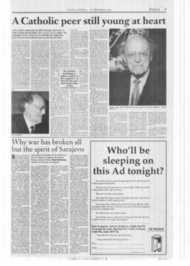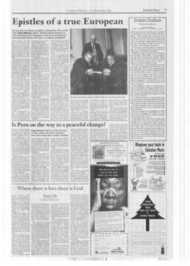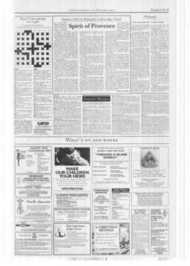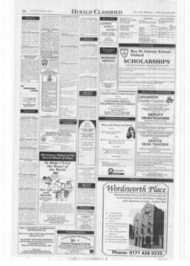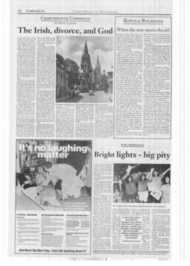Page 7, 1st December 1995
Page 7
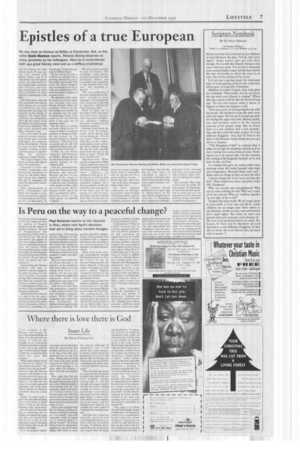
Report an error
Noticed an error on this page?If you've noticed an error in this article please click here to report it.
Tags
Share
Related articles
7
G.k.c.'s Independent Weekly Ceases Publication
G. K. Chesterton's Famous "father Brown"
Warrior For The Faith
"catholic Herald" Book Of The Week
Epistles of a true European
He was never as famous as Belloc or Chesterton. But, as the writer Erwin Bannon reports, Maurice Baring deserves as many accolades as his colleagues. Here he is remembered both asa great literary mind and as a selfless invidividual.
MAURICE EALING, WHO died almost exactly 50 years ago this wee, formed with Hilaire telloc and G K Chesterton a trio of Catholic writers vselo were known to the world at large as eminent men of letters, and were hero-worshipped by their fellow-Catholics for their staunch commitment to the faith.
Like Chesterton, who was born one month after him in 1874, Baring was a convert to Catholicism and when subsequently recording his reception in his volume of memoirs, The Puppet Shout of Memory, he commented, "It is the one action of my life which I am quits certain I have never regretted." He had, in fact, pondered long before taking the step.
Nine years earlier he had written in a letter to his lifelong friend and eventual biographer, the composer Dame Ethel Smyth: "I wish we were all horn Roman Catholics. 1 believe in their spirit but refuse to acknowl edge the exclusive supremacy of their Church...
"But I have bought L'Ave Maria des Mures and 1 play it when I'm feeling low."
Educated at Eton and (briefly) Cambridge, and having little inclination or talent for the family banking business, but a remarkable gift for languages, he chose the diplomatic service as a career.
After appointments in Paris, Copenhagen and Rome, he switched to journalism and served as special correspondent for the Morning Post in Manchuria, St
Petersburg, Constantinople and the Balkan States.
By the time he became a Catholic he already had a growing reputation as poet, playwright and novelist. His poetry has dated, though it was very popular in its day (a collection published in 1917 went through five reprints in as many years).
His dramatic work, which he seems not to have taken very seriously, drew from George Bernard Shaw the comment, "I don't see why the dickens you should not go regularly into the trade of playwriting. Some of the scenes in The Grey Stocking show a very rare sort of dramatic talent."
But his fame as a writer was built chiefly on his 15 novels of which so recent an authority as Margaret Drabble has written (in The Oxford Companion to English Literature), "They were very successful and are still well regarded for their acute, intimate portrait of the time."
Unlike his two fellow "triumvirs", GK Chesterton and Belloc, Baring did not use his literary talent for the explicit defence of the Catholic faith.
Like his contemporaries across the Channel, Georges Bernanos and Francois Mauriac, he left it to the readers of his stories to discern the working of grace in their lives and characters of the people in them. Only two of his works, Robert Peckham (1930) and In my End is my Beginning (1931) historical novels of the Tudor period are explicitly "Catholic".
His total output amounted to some 50 volumes. The crowning achievement, produced during his last protracted illness and compiled at the suggestion of Mgr Ronald Knox, was Have You Anything to Declare?
This was a collection of favourite extracts from a lifetime's reading in seven languages, with translations and commentary reflecting an exquisitely cultured and truly European mind.
When he died, on 14 December 1945, after bearing with heroic patience some nine years of progressive paralysis, tributes poured in testifying to his admirable qualities.
Marshal of the Royal Air Force, Lord Trenchard, under whom Baring had served during the 1914-18 war, wrote: "There was a staff officer in any country, in any nation, in any century, like Major Maurice Baring. Ile was the most unselfish man I have ever met or am likely to meet... Words fail Me to describe him."
Mgr Knox wrote: "Without any background of High Church apprenticeship or of disgruntled atheism, he fitted effortlessly into the Church whose allegiance he embraced at the age of 35... If I put on record here that he remained nbt merely a convinced Catholic, but a devout Catholic, all the rest of his life, with a strong love of the Mass and of the liturgy, it is only lest those who knew him little should draw false conclusions; he had an instinct of reticence
about his deeper feelings, which made it impossible that he should ever be a sabre-rattling convert..." Robert Speaight called him "one of the great European spirits of his time".
The Times obituary commented on Baring's exceptional understanding of European affairs, and his rare knowledge of foreign traditions, manners, customs
and literature, but said also that he "was above all concerned to express a passionate conviction that belief in God can alone bring storm-tossed humanity into harbour".
The Catholic Herald published on its front page an "appreciation" by the most famous English Jesuit of the day, C C Martindale, who commented on Baring's
principal books, showing how they were permeated with a Catholic spirit, without ever lapsing into propaganda.
He concluded: "But a man is more than his books. He had a genius for friendship, he was immeasurably generous in word and act; his long-drawn illness blazoned forth his courage, and further revealed his gentleness."
blog comments powered by Disqus


